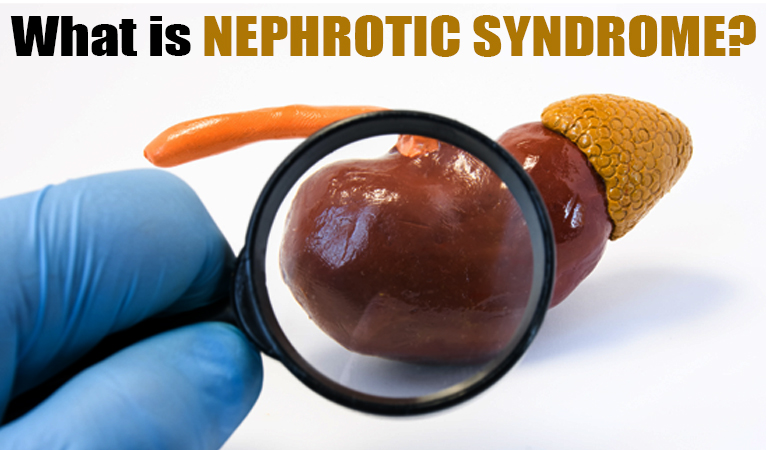Nephrotic syndrome is a condition that allows too much protein to
skip into the urine. It is usually caused by damage to the filters that
absorb protein and other vital nutrients and send them back into the
blood during the blood filtration process. During nephrotic syndrome,
the body loses a protein called albumin. Albumin prevents the excess
fluid from seeping into the cells and tissues. It is common to notice
people with nephrotic syndrome having swelling, particularly in the feet
and ankles.
Nephrotic range proteinuria is the loss of 3gms of protein per day or more into the urine.
Nephrotic syndrome includes the following:
Albuminuria: Heavy protein amount in the urine
Hypoalbuminemia: Low protein amount in the blood
Hyperlipidemia: Higher than normal fat and cholesterol levels in the blood
Edema: It is the swelling characterized by the presence of too much fluid in the blood cells and tissues.
The treatment for nephrotic syndrome includes treating the condition with the help of nephrotic syndrome ayurvedic medicine. Ayurvedic medicine helps to decrease the risk of infection and blood clots that may come along with the nephrotic syndrome.
Symptoms
It
is important to look for the signs and symptoms to prevent any serious
complications in the later stages. Suppose nephrotic syndrome is not
addressed timely, the risk of developing chronic kidney disease
manifolds. So, it is essential to know what signs may appear when your
body is exhibiting too much protein.
Common signs may include:
Swelling: Swelling or edema appears around the lower body portion, such as in your ankles and feet.
Foamy urine: The protein called albumin may give you a foamy or frothy appearance as you urinate.
Weight gain: As more fluid retains in the cells and tissues, it is not uncommon to notice sudden changes in weight.
Loss of appetite: Appetite levels may also change during nephrotic syndrome.
Risk
of infections: Infections are more common in people who lose albumin.
Albumin prevents blood clots and boosts the body’s power to fight
infections.
What are the complications of nephrotic syndrome?
Nephrotic
syndrome can lead to a variety of complications in people. Blood clots
can block the blood flow and oxygen through a blood vessel and cause you
life-threatening situations. These may include:
Lack of immunoglobulins:
A protein that is related to your immune system may help fight
infections. Losing immunoglobulins can raise your risk of pneumonia,
cellulitis, peritonitis, and meningitis. In addition, medications given
to treat nephrotic syndrome may increase the risk of one or more
infections in the body.
Hypothyroidism: Impaired kidney function results in low production of thyroid hormones to meet the body’s needs.
Anemia: It is a condition resulting in fewer production of RBCs than needed by the body.
Coronary artery disease: Also called coronary heart disease, it develops due to the narrowing of the arteries that provide blood to the heart.
Acute kidney injury: Sudden and abrupt loss of kidney function.
High blood pressure:
The pressure against which the blood flows through the vessels is
higher than normal. It is common to have high blood pressure during
impaired kidney function.
Nephrotic syndrome is usually caused by damage to the clusters of tiny blood vessels (glomeruli) of your kidneys.
The
glomeruli filter your blood as it passes through your kidneys,
separating things your body needs from those it doesn't. Healthy
glomeruli keep blood protein (mainly albumin) — which is needed to
maintain the right amount of fluid in your body — from seeping into your
urine. When damaged, glomeruli allow too much blood protein to leave
your body, leading to nephrotic syndrome.
Many possible causes
Many diseases and conditions can cause glomerular damage and lead to nephrotic syndrome. They may include:
Diabetic kidney disease. Diabetes can affect the glomeruli and allow the protein to skip through them.
Minimal
change disease. This is the most prevalent cause of nephrotic syndrome.
Minimal change disease means the kidney is performing abnormally, but
if you examine the tissue under a microscope, it nears to be normal. And
the cause of this disease cannot be determined.
Focal segmental
glomerulosclerosis. Characterized by the scarring of the glomeruli, it
is a genetic condition that may occur for no apparent reason.
Membranous
nephropathy. It is a kidney disorder resulting in the thickening of the
membranes within the glomeruli. It is caused by medical conditions such
as hepatitis B, malaria, cancer, lupus, etc. The faults in the immune
system may allow deposits to buildup in the glomeruli. This chronic
inflammatory disease can lead to serious kidney damage.
Amyloidosis. The buildup of amyloid proteins can accumulate in your organs. This affects the kidney’s filters.
What is the best treatment for nephrotic syndrome?
Nephrotic syndrome can be easily cured with the help of the best nephrotic syndrome ayurvedic medicine.
The medicines made with rare roots and herbs combination help to
rejuvenate the damaged glomeruli and their membranes. This allows the
protein to be absorbed properly without any complication. Also, the
medicines are curated in a way so as to reprieve the root cause of the
problem. This enforces the kidney to function well so that the risk of
chronic kidney disease can be delayed.
Get your nephrotic syndrome ayurvedic medicine from Karma Ayurveda Health now!
Home Nephrotic syndrome Ayurveda treatment What is nephrotic syndrome?
Subscribe to:
Post Comments
(
Atom
)








Post a Comment